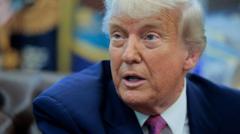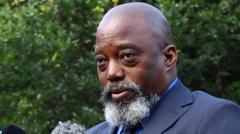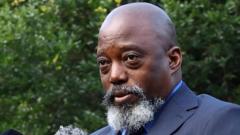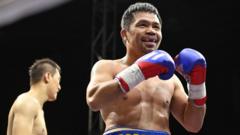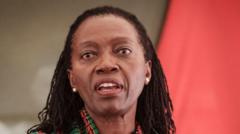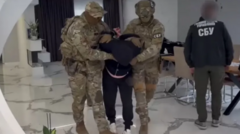The recent return of Joseph Kabila, former President of the Democratic Republic of Congo, to his homeland has ignited significant controversy, particularly as he grapples with accusations of treason linked to the M23 militia. Having been in self-imposed exile, Kabila’s re-entry into Goma, a city currently under M23's control, complicates the already fraught political landscape in the region and poses obstacles for peace negotiations.
Joseph Kabila's Controversial Return: A Political Resurgence Amid Accusations

Joseph Kabila's Controversial Return: A Political Resurgence Amid Accusations
In a surprising political twist, former DR Congo President Joseph Kabila returns home amidst allegations of treason linked to militia support.
On May 27, 2025, Kabila's arrival was confirmed by an adviser, just days after the Congolese Senate voted to accuse him of supporting the Rwanda-backed M23 militia, which has claimed large territories this year. The Senate's call for prosecution cannot easily reach him while he remains in a region where Congolese government authority is virtually non-existent.
Kabila's decision to return precisely at this moment raises eyebrows among political analysts and local citizens alike, as it aligns with ongoing diplomatic efforts by the United States to mediate tensions between Congo and Rwanda, alongside negotiating mineral deals involving both nations. Kabila, who ruled for 18 years, remains an influential figure, and his presence in Goma may further complicate these peace efforts.
In a recent social media video, Kabila accused current President Felix Tshisekedi of ruling as a dictator. This tension dates back to the 2018 presidential election when Kabila's chosen successor faced defeat but specters of electoral fraud loomed over the process, culminating in Tshisekedi's subsequent power-sharing agreement with Kabila's party—a partnership that ended abruptly a year later.
During his arrival in Goma, Kabila received a warm welcome from Corneille Nangaa, M23's political leader and a former election commission figure who previously played a significant role in installing Tshisekedi as president. The political implications of Kabila’s return are profound, hinting at a potential resurgence in a deeply contested political arena, while the motivations behind his timing remain a topic of speculation among stakeholders in the region.
Kabila's decision to return precisely at this moment raises eyebrows among political analysts and local citizens alike, as it aligns with ongoing diplomatic efforts by the United States to mediate tensions between Congo and Rwanda, alongside negotiating mineral deals involving both nations. Kabila, who ruled for 18 years, remains an influential figure, and his presence in Goma may further complicate these peace efforts.
In a recent social media video, Kabila accused current President Felix Tshisekedi of ruling as a dictator. This tension dates back to the 2018 presidential election when Kabila's chosen successor faced defeat but specters of electoral fraud loomed over the process, culminating in Tshisekedi's subsequent power-sharing agreement with Kabila's party—a partnership that ended abruptly a year later.
During his arrival in Goma, Kabila received a warm welcome from Corneille Nangaa, M23's political leader and a former election commission figure who previously played a significant role in installing Tshisekedi as president. The political implications of Kabila’s return are profound, hinting at a potential resurgence in a deeply contested political arena, while the motivations behind his timing remain a topic of speculation among stakeholders in the region.


